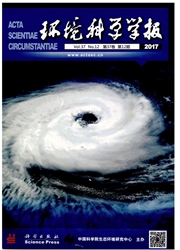

 中文摘要:
中文摘要:
垃圾焚烧飞灰是危险废物因而必须进行处理.用冶金高温熔融分离来处理飞灰是一个新的无害化处理方法.在了解飞灰特性的基础上,研究了飞灰的冶金性能.对飞灰进行冷固结造球,并分析了球团的强度和浸出毒性;测试了球团的粘度和熔化性温度;进行了飞灰球团高温熔融分离实验,分析了熔渣中的重金属和浸出毒性.实验结果表明,飞灰的矿物组成主要是CaO、SiO2等氧化物;选择7%消石灰,添加1%糖浆进行飞灰冷固结,并养护18d,单个球团平均抗压强度可达到1005N,球团的浸出毒性没有超标.飞灰的熔化性温度范围为1250~1290℃,此时的熔渣粘度较低;飞灰高温熔融分离的适宜工艺参数为:熔融温度1400℃,熔融时间10min,球团碱度1.8,金属熔池与飞灰球团配比为5∶4,金属熔融分离效果很好;飞灰经过1300℃以上的高温熔融,熔渣远远低于浸出毒性标准.
 英文摘要:
英文摘要:
Fly ash from municipal solid wastes incineration (MSWI) must be disposed of effectively as hazardous waste. A new harmless disposal method is melting separation of heavy metals. Based on the characteristics of the known MSWI fly ash, the metallurgical characteristics of the fly ash were studied. The MSWI fly ash was made into pellets by cold agglomeration and analyzed for its compressive strength and leaching properties, as well as tested for its viscosity and melting temperature. The pellets were smelted at high temperatures to separate metals, and the slag was tested for heavy metal content and leaching properties. The results indicated that the mineral component of fly ash was mostly oxides such as CaO,SiO2. The optimal technology to make cold agglomerated pellets of fly ash was to add 7% hydrated lime and 1% industrial syrup, then cure for about 18 days. The mean compressive strength of a single pellet was up to 1005 N, and the leaching concentration of pellets did not exceed the Leaching Character Standard. The melting temperature range of the fly ash was from 1250℃ to 1290℃, while the viscosity of the fly ash was comparatively low. The optimal conditions for melting separation were a melting temperature of 1400℃, melting period of 10 min, pellet basicity of 1.8 and ratio of metal melting bath to pellets of 5:4. The melting selbaration was highly efficient under these conditions. Furthermore, the heavy-metal leaching concentration of fly ash slag was lower than the leaching standard when melted above 1300℃.
 同期刊论文项目
同期刊论文项目
 同项目期刊论文
同项目期刊论文
 期刊信息
期刊信息
